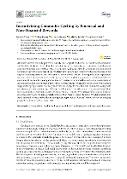Incentivizing commuter cycling by financial and non-financial rewards

Publication date
2020Published in
International Journal of Environmental Research and Public HealthVolume / Issue
17 (17)ISBN / ISSN
ISSN: 1661-7827ISBN / ISSN
eISSN: 1660-4601Metadata
Show full item recordCollections
This publication has a published version with DOI 10.3390/ijerph17176033
Abstract
Current mobility patterns over-rely on transport modes that do not benefit sustainable and healthy lifestyles. To explore the potential for active mobility, we conducted a randomized experiment aimed at increasing regular commuter cycling in cities. In designing the experiment, we teamed up with developers of the "Cyclers" smartphone app to improve the effectiveness of the app by evaluating financial and non-financial motivational features. Participants in the experiment were recruited among new users of the app, and were randomly assigned to one of four different motivational treatments (smart gamification, two variants of a financial reward, and a combination of smart gamification and a financial reward) or a control group (no specific motivation). Our analysis suggests that people can be effectively motivated to engage in more frequent commuter cycling with incentives via a smartphone app. Offering small financial rewards seems to be more effective than smart gamification. A combination of both motivational treatments-smart gamification and financial rewards-may work the same or slightly better than financial rewards alone. We demonstrate that small financial rewards embedded in smartphone apps such as "Cyclers" can be effective in nudging people to commute by bike more often.
Keywords
active mobility, randomized experiment, behavioral change, incentives, smartphone app
Permanent link
https://hdl.handle.net/20.500.14178/2485License
Full text of this result is licensed under: Creative Commons Uveďte původ 4.0 International







